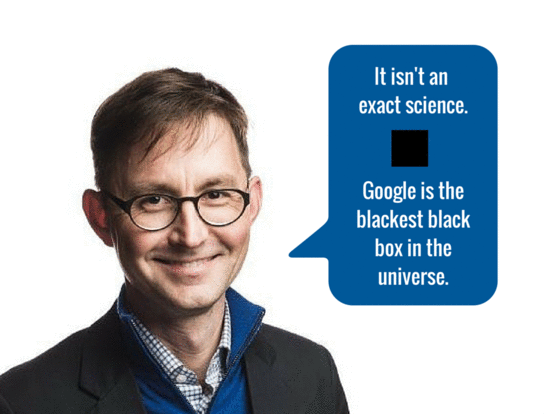The “SEO is dead” parade marches on. Even some search professionals are now writing obits for their old friend.
But search continues to thrive. It continues to drive traffic more than, well, anything. So what gives? For any given search, ten web pages are going to command page one rankings and earn waaaaaay more clicks than the gazillions of pages that follow.
If you’re a content marketer, you’d love to see your next blog post on the first page of Google. How important is it to understand SEO? It’s crucial.
I’ll be straight with you. If you want to play last decade’s lightweight Google games, you’ve come to the wrong place. A pro like Andy Crestodina won’t indulge you.
However, if you want to talk about creating immensely useful content while executing a strategy to rank atop Google SERPs (search engine results pages), you’d want to listen to Andy, if you could. And you can.
Right now. Right here. I present my friend, the content chemist himself, with a full set of answers on how he gets his blog posts on the first page of Google and how you can do the same.
Listen to Andy Crestodina of Orbit Media explain:
• How he puts in the effort—in advance—to create blog posts with a very high chance of landing on the first page of Google.
• Why it’s always more important to appeal to readers than searchbots.
• His formula: traffic x conversions = success.
• The three questions that must be asked and answered:
- Is anyone searching for this phrase?
- Do I have a chance of ranking for the keywords?
- Can I make the best page on the internet for the chosen topic?
• The number one factor for ranking in Google.
• What to do after you publish.
• A better name for “SEO.”
• A more effective approach than keyword density.
• The case of the ambidextrous armadillo.
Highlights from this interview include:
Click-through rates
90 plus percent of clicks in Google are happening on the first page. Something like 18-plus percent of those are on the first position.
The best way to get your content discovered
I put in extra time and effort and energy into finding key phrases and underlining pages with key phrases and indicating relevance for those phrases. Knowing that it’s really my best, and only chance, of having content that gets discovered and read and shared and attracting an audience weeks and months and years after it goes live.
Email marketing and social media have very short half-lives so those are great sources of traffic, but in the long run I know if I write something and it’s going to get read next month or next year that’s just not going to happen unless I successfully ranked it by targeting a key phrase and indicating relevance.
The formula for success
Traffic times conversions equal success. You have to have visitors and then the visitors have to take an action. Or else it was worthless, so anything times zero is zero. So we want visitors to come to the site. That’s the first number and then a percentage of those visitors to act; that’s the second number. So all the ranking and all the traffic in the world, will do nothing for your business at all unless you also have a conversion rate.
Three important questions to rank on page one of Google
We’re going to ask ourselves three questions in this process…
The first one is really, is anyone searching for this phrase? We need to find a phrase that people are actually looking for. Because there’s no point in ranking for a phrase if no one’s looking for it.
Question two is, do I have a chance of ranking for it?
And then, question three is, can I make the best page on the internet for the topic?
If you answer yes to all three of those, it’s a worthy cause. With two out of three, don’t bother.
The rise of semantic search
Google is now paying a lot of attention to semantics and synonyms and grammatical forms and it’s really a search engine of topics more than phrases these days. But the tool only lets us search for phrases, so there’s lots of little ways in which that number is not super accurate. It’s the exact matched number. It does not show synonyms or any semantical linking. So just for that reason I’m just kind of validating yes or no people are looking for it or not?
It’s not really about key phrases anymore. It’s more about topics. So when you enter a key phrase it tells you, yes or no, people are looking for that exact specific exact matched phrase. That’s good enough for me.
I target things, sometimes they may look very low, but that’s fine. I just want to check to see, is there some volume on it? Is there some interest in the topic? Is that truly a phrase that people use? Or a top of mind phrase? Is there demand for the general subject?
Long tail keywords
So I target lots of very long specific phrases, but surprisingly there is demand for them. I rank right now I think for, “How Does Social Media affect SEO?” That’s a long phrase. It’s a full sentence. But something like 60 people a month are searching for it. That’s quite a few people. So it’s often surprising.
Here’s a trick, go to keywordtool.io. I used to Ubersuggest, now I use keywordtool.io. It will scrape Google Suggest for you and give you all kinds of suggested key phrases. Some of them are very, very long. Those are phrases that yes, someone’s’ looking for or else it wouldn’t appear in Google Suggest. And so try targeting one of those phrases. They’re going to be eight and ten-word phrases sometimes. Great. Pick that phrase. There’s some demand for it. It might be fewer than ten searches per month but you’ll start ranking.
Page authority and domain authority
The number one factor in Google for ranking has, is, and will always be, the authority of the page. In other words the link popularity of the page and the domain in general. Are other sites linking to it? Is it credible among other sites?
If your site has credibility among other websites as in backlinks or incoming links from other sites then you have more authority and you have a better chance of ranking in general.
Knowing what your domain authority is—domain authority, for the record, is just a proxy for Google’s own metric, which is called PageRank—which Google doesn’t share with us anymore, so just use domain authority. Domain authority you can look up using opensiteexplorer.org. And it will give you a number. It’s one to 100. So you may have a domain authority of 30 or of 60. Whatever that might be. Now here’s’ the trick and this is what most people miss. And this is the breakdown 101: if you learn one thing from this video take this away.
Target phrases for which the domain authority of the other high ranking pages is in the same range as yours.
If the other sites have a domain authority in the 80s and 90s, you’re going to need a site with a domain authority in the 80s and 90s, to successfully compete with those sites for that topic. If the other sites are in the 20s and 30s and 40s you’ll have a chance if you’re in that range.
We joke… don’t enter the Indy 500 on a bicycle, you’ll lose every time. But you might win the Tour de France. You’ve got a bicycle. You’re going to win every marathon. So if your domain authority is in a certain range, let’s say the 40s, don’t target phrases for which the other high-ranking sites have a domain authority much higher. But go ahead and target anything in the range of the 40s or lower.
Sites with higher domain authority have a much higher overall likelihood of appearing high in the search results in Google. So there’s numbers here. The statistical correlation is something like .39. It’s a very high correlation compared to other factors.
The power of guest blogging
A great content marketer is not stuck on their own site. Get out there. Write for other people.
Making SEO pay
SEO is slow. I can’t think of a slower form of marketing. IT takes a long time. It took me seven years to rank high for Chicago Web Design.
Again, question three is “can I make the best page on the internet for that topic?” Can I really write something great? Is it worthy of ranking? Google has 2,000 math PhDs on staff. You’re not going to trick them. You really have to make something great and deserving of rank or else, why bother? So, as you write that great piece of content on the topic, focus on the reader, be legit, write something good.
Indicate relevance (a better name for SEO)
Once you’ve done that just go back and make sure that you indicated relevance. And I think we should just call it (SEO) indicating relevance. I always say this phrase. I think we should rename SEO “indicate relevance.”
Did you use the phrase in those most important places to tell Google that yes, you are truly about this topic? Is it in the title? Is it in the header? Is it in the body? And is it in the meta description? Leave it at that.
Don’t just use the specific phase four to six times or a certain percentage of density. Try to use different forms. Different related phrases. Phrases that are compliment to that. Phrases that are in the family in that topic.
You can better indicate relevance by making the page more focused on the topic. You can do whatever you can to try to make the page higher quality. Simply improve the page. Make it longer. Make it more specific. Add a video. Add graphics.
Ultimately we’re not going to try to reverse engineer Google as much as we are trying to collaborate with Google to help visitors discover quality. Help them surface great content, so they get better content. That’s advice that SEOs don’t say enough, “Hey, your pages don’t rank yet? Make it better. Go improve it.”
Learn more about Andy Crestodina of Orbit Media Studios.
Check out Andy’s book, Content Chemistry: An Illustrated Handbook for Content Marketing







![Business Blogging Trends – 4th Annual Survey [Content Jam Episode 36] Business Blogging Trends – 4th Annual Survey [Content Jam Episode 36]](https://feldmancreative.com/wp-content/uploads/2018/10/Content-Jam-podcast-36.jpg)
Comments
Andrew Bowker
Thank you, Barry and Andy. Very enlightening, and indeed reassuring to know that ‘SEO is slow’. We’re not necessarily doing anything wrong; we just need to do more right.
How to Get Your Blog Post on the First Page of Google
[…] article “How to Get Your Blog Post on the First Page of Google” first appeared on Feldman […]
Ken Carroll
I appreciate this work, guys. There’s a lot of knowledge and preparation that went into the post and the video. Well done.
Barry Feldman
Thanks Ken. Glad you watched it. After trying Andy’s strategy please give us an update on how things went for you. I know the more I apply Andy’s tips the better visibility I gain with search.
Sumit Sharma
Really an insightful post about algorithm and how we can get to first page of google for any search query. Great Job
Thanks
Sumit
Barry Feldman
Thanks Sumit. Andy is indeed quite a knowledge bank.
Gill Andrews
Guys, I never watch videos or listen to podcasts “for work”, but I just listen to this from the beginning to the end while making notes. On a Sunday. Past midnight. So… good stuff!
Yet, I would dare to add one more point to the 3 questions Andy said you need to ask yourself when you decide whether you should try to rank for that keyword (are people searching for it / do I have the change to rank / can I write A+ content):
#4 Is the searcher’s intent is already satisfied with the B- content that is out there?
Because if the searcher’s intent regarding this phrase is indeed already satisfied with whatever is out there, I would agree with Ross Hudgens (minus the big brand reference; I think it holds for any brand, even in your own domain authority range) who literally said this:
“10x content is great, but if searcher satisfaction happens at 1x, you won’t beat the big brand who commands the first click.”
… in this article: http://www.siegemedia.com/seo/skyscraper-technique
What do you think about this?
Thanks.
Barry Feldman
Hmm. I think that’s overthinking it. I mean, you (and Ross) may be onto something, but I think the quality of the content matters most in any case and beating the big brand is not the goal.
The goal is to get discovered, generate traffic and give your site and blog a chance to connect with the reader.
I hope Andy will add his thoughts too, Gill. Very appreciative of your time and ideas.
Gill Andrews
Hi there Barry 😉 Again, thanks so much for putting this together!
Re my suggestion for #4:
The “big brand” reference only makes sense in the context of Ross’s article. My point is that it applies regardless of the source of the other results out there.
For example, if I searched for “how to make chicken soup” and a “boring” post that ranks higher already has all the info on that / gave me all the info I needed, I won’t care for a 1500+ post with an infographic and a round-up of a 15 cooking experts on soups.
Of course, quality of the content matters, no question about that. Maybe Andy already takes this aspect into account when he talks about quality of a post. Let’s see what he thinks about it 🙂
Andy Crestodina
I would probably still go for that phrase. As long as I’m not too far below the DA of the high ranking pages, I’ll still make the page.
If they’re 1x and you’re 10x, you can win for phrases even if you’re less authoritative. And if you made a better page, you just made the internet a better place!
Also, search is a competition and there is no reason to let the big guys win. Fight hard, keep promoting that piece and you can show them who’s boss. Never give up!
There is already a “good” page on every topic. But the job of the SEO is to make a great page on the topic. The best page.
Turn on Mozbar and search for “web design standards” You’ll see I have lower DA than every site on the page. But I rank #2 (plus, I’ve won the answer box, which is like ranking #0) That page attracts around 4k visitors per month …because it’s 10x!
Gill Andrews
Hi there Andy 🙂 Thank you for the quick response.
Oh, I’m not doubting that you should go for it if your domain has lower authority. You explained it brilliantly, and I completely agree.
The only thing I was saying was, that even if you think the content that ranks now is meh and you can create something better, you should also look at the search phrase you are targeting and ask yourself whether better content is necessary or whether whoever searches for it will get all the info they need from the posts that are out there already.
Unfortunately, I don’t have a concrete example right now, but I can imagine this to be the case for yes/no questions (short or long), for example.
In the case of “web design standards” that you mentioned this was not the case.
Other results that are on page #1 are either official documents (and who wants to read that?) or don’t even have that phrase in their titles. So your page definitely fills the void that searches had at this point + the headline is really good.
So it depends from case to case, but I think this is a legitimate question to ask yourself: Is 10x necessary here?
Re making internet a better place:
😀 I’m all for it! But if this is the only thing I get from slaving for a post for weeks I would rather let someone else make it a better place, and will go for some other phrase I see there is a definite void there when it comes to satisfying the searcher’s intent 😉
Just my 2 cents (or more like 20 bucks :))
Amanda Puentes
Great article. As always, inspiring.
Commented by: amanda puentes
RonaldFum
prommehdetal.ru
Toy Kitchen For Creating Music Mind | Royal Tooba
[…] hone a specific skill while inspiring creativity and imagination, then it is an even better toy. toy kid car jeep should be fun, however you are even better if they will help your youngster developmentally also. […]